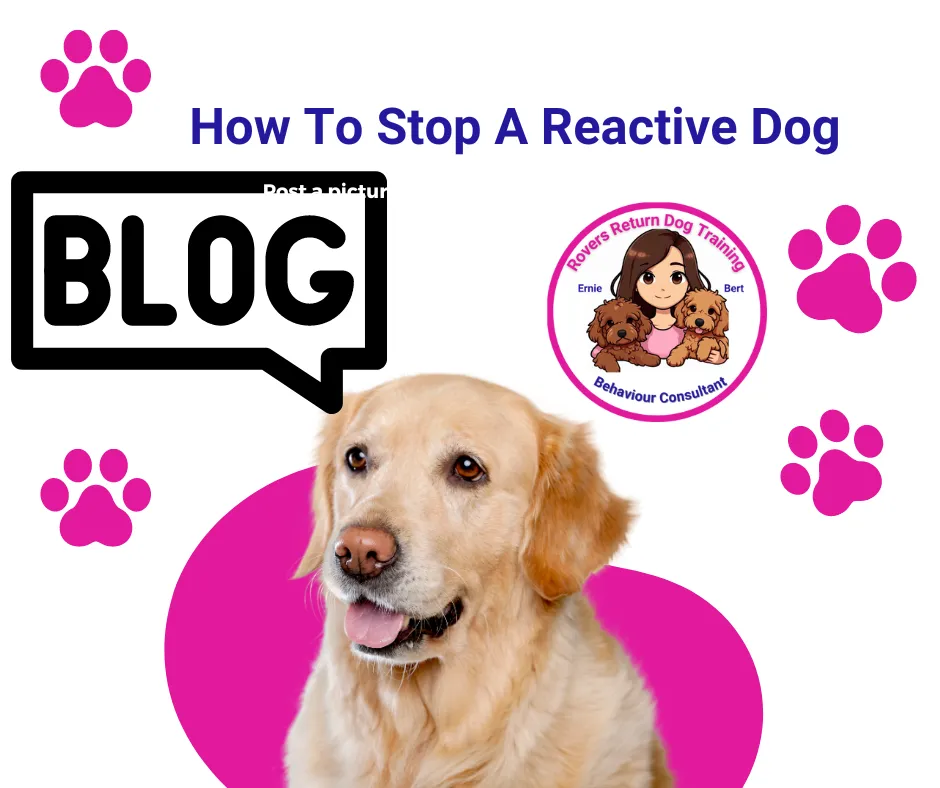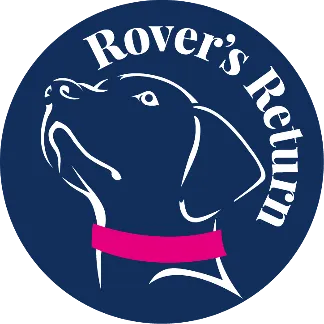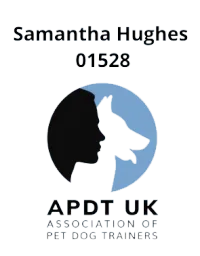Book a FREE 1:1 Assessment Call By Clicking HERE
Specialising In Dog Reactive Behviour
Accredited by APDT, ABTC and UK DOG Behaviour and Training Charter
Qualified and Experienced
Force Free Trainer and Behaviourist
Dog Training Leicestershire Educational Blogs

How To Stop My Dog's Reactivity
Understanding and Helping Reactive Dogs: A Comprehensive Guide
Introduction:
Reactive dogs can present challenges for owners, but with patience, understanding, and the right approach, it's possible to help them overcome their reactive behaviours.
Whether your dog barks, lunges, or displays other concerning behaviours toward people, animals, or stimuli, there are effective strategies to manage and modify their reactions.
In this guide, we'll delve into the reasons behind reactive behaviour and provide practical tips to help you change the way your dog feels about the world
Understanding Reactive Behaviour:
Reactive behaviour in dogs typically stems from fear, anxiety, or frustration. It can be displayed in various ways, such as barking, growling, lunging, or even aggressive actions. But some dogs may display more passive behaviour such as freezing, hiding, or trying to get away. The internal emotions are the same, but the outward expression of behaviour differs.
Understanding your dog's motivation that triggers their reactive responses is crucial in effectively managing their behaviour.
Common triggers include unfamiliar people or animals, loud noises, fast movements, or specific environments.
It is important to understand that stopping the behaviour isn’t always the most effective way of treating your dog's fears and anxieties. Treating their need for the behaviour will in time make the behaviour redundant.
Tips to Reduce Reactive Behaviour:
Positive Reinforcement Training:
Positive reinforcement techniques involve rewarding desired behaviours to encourage their repetition. With this in mind when your dog is reacting to stimuli, it can be seen that using reward-based training will increase the reactivity. But this is not the case. The brain is in fight-or-flight mode, a reflex response that takes over and all other non-essential functions are downregulated. You cannot reinforce fear and reflex responses with food. The behaviour they display is reinforcing because it works for them, otherwise they wouldn’t do it, offering space, kindness, and food if they can take it will only seek to make them feel better about the situation, not worse.
When working with a reactive dog, focus on reinforcing calm and non-reactive behaviour. Use treats, toys, or praise as rewards when your dog remains calm in the presence of triggers. This helps to associate positive experiences with previously stressful situations.
If your dog cannot take food at that time it is due to not being able to cope in that situation. The best reinforcement for behaviour reduction is space away from the triggers and time to decompress.
Desensitisation and Counterconditioning:
Desensitisation involves gradually exposing your dog to their triggers at a safe distance and under controlled circumstances.
Start by identifying your dog's threshold—the distance at which they react—and gradually decrease it over time as they become more comfortable.
Both of these techniques work well to reduce reactions, however, they must be used effectively to help the dog grow.
These techniques are not simply just feeding your dog food when stressed. When used correctly, they are scientifically proven methods for changing the emotional responses to stimuli, building the ability to disengage from triggers and helping the dog feel safe.
Management:
Managing your dog's environment is crucial for preventing reactive outbursts. When your dog reacts their behaviour is reinforced as it is keeping them safe
Create a safe space at home where your dog can retreat when feeling overwhelmed. Avoid exposing your dog to situations that trigger their reactivity whenever possible.
Vet Check For Pain Or Illness
Sudden changes in behaviour are often linked to pain, injury or health problems.. Your dog cannot tell you when they are in pain or feeling ill. They may begin to display abnormal or aggressive behaviours that you don’t normally see as a way to communicate that they are not well. A vet check is advised to rule out pain and illness
Seek Professional Help:
If your dog's reactive behaviour persists despite your efforts, seek guidance from a professional holistic behaviourist. They should be qualified in dog behaviour, as it is a specialised service. A dog behaviourist should take a full history and assessment and create a behaviour modification plan.
This type of training takes time and a good behaviourist will give you an indication of the work that is required to help your dog.
Rovers Return Dog Training is qualified in dog behaviour and training.
Patience and Consistency:
Changing reactive behaviour takes time, patience, and consistency. Be prepared for setbacks along the way and celebrate small victories. Consistently apply training techniques and remain calm and composed during training sessions. Your dog will pick up on your emotions, so maintaining a positive and patient attitude is essential.
Conclusion:
Helping a reactive dog requires empathy, understanding, and commitment. You can help your dog overcome their reactive behaviour by using positive reinforcement, desensitisation, counterconditioning techniques, and proper management and professional guidance. Remember to be patient, stay consistent, and celebrate progress when it happens.
In time and with your love and effort, you can build a stronger bond with your dog and create a happier, more harmonious relationship.
Highly Qualified Behaviourist
Accredited by APDT, ABTC and UK DOG Behaviour and Training Charter
Accredited Scentwork Instructor
Force Free Trainer and Behaviour
Force Free Trainer and Behaviour
Accredited Scentwork Instructor
Accredited by APDT, ABTC and UK DOG Behaviour and Training Charter
Highly Qualified Behaviourist
Contact Us
Sam: 07725 802995
You can contact us via Live Chat button at the bottom of the screen or the contact box to the right.
You can also book one of our services online using the View Dates buttons under the service you require.
© 2023 by Rovers Return Dog Trainers Academy - Force Free Dog Training Lutterworth, Broughton Astley, Leicestershire, Hinckley, Nuneaton, Stoney Stanton, South Kilworth, Ullesthorpe
Privacy Policy | Terms and Conditions | Terms and Conditions of Services | Sitemap





Facebook
Instagram
X
LinkedIn
Youtube
TikTok